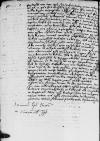Quae in scheda scripsit ad me Reverendissima Dominatio Vestra, ea cum
serenissima
⌊maiestate regia⌋ communicavi, cum praesens adesset ⌊reginalis maiestas⌋. Legi ⌊utrique⌋ schedam, iis tamen omissis, quae ad rem non pertinebant. De ⌊regia maiestate⌋ certo possum polliceri Vestrae Reverendissimae Dominationi, quod grata ei accidunt, quae ab ea proficiscuntur omnia, neque est, quod dubitet, quin sit apud maiestatem eius valde gratiosa. De aliorum in se gratia per me quidem licet, ut sibi quidvis Reverendissima Dominatio Vestra promittat, sed ego tamen, quid ea de re scribam, non habeo neque sponsor esse animi cuiusquam et voluntatis possum. De ⌊Constellato⌋ quae scripsit Reverendissima Dominatio Vestra, legi ⌊principibus⌋. Quin ⌊ille⌋ de me dixerit ea, quae ad Reverendissimam Dominationem Vestram sunt delata, mihi quidem dubium non est. Nam et ⌊reginalis maiestas⌋ etsi auctorem non nominavit, tamen se quoque accepisse dixit me audiente in regia praesentia, quod melius omnia casura fuissent, si ego profectus non essem. Hoc etiam adiecit questum esse ⌊Constellatum⌋, quod secum asperius egissem ac durioribus eum verbis aggressus essem, quod meum factum reprehensione dignum iudicabat. Cui ego respondi: me nequaquam ire inficias, quin libere cum eo egerim, quem sciebam esse caput et fontem malorum istorum omnium, quae sunt ⌊Gedani⌋ exorta; sed ut ita agerem, postulasse personam, quam tum gerebam. Cum enim abiecta privata persona, regia mihi fuisset imposita, minime decere videbatur, ut blande ac submisse cum eo agerem, cuius unius prope opera et multa indigna patrata et ipsa Christi religio ⌊Gedani⌋ esset proculcata.
Videt Reverendissima Dominatio Vestra, quae sit nostra condicio, qui non postremum inter ⌊regni consiliarios⌋ locum obtinemus, qui fidem nostram et erga Deum et erga ⌊principem⌋ intemeratam retinemus. Levibus hominibus clanculum de nobis quidvis comminiscendi potestas permittitur, nobis respondendi facultas non datur. Scilicet, qui fidem semel Deo datam violavit, is iam plus est fidei habiturus. Non dubito, quin is non modo de me, verum et de Vestra Reverendissima Dominatione multa falsa detulerit, fortassis non tam ipse sua voluntate, quam instruc[tus] ab eo, a quo huc missus est. Nam hae artes in aula regia numquam adhuc fuerunt post hominum memoriam, quibus nunc sursum atque deorsum omnia misceri videmus. Utinam vero iis potius, [a] quibus proficiscuntur, quam ⌊Regno⌋ universo si[nt] exitio. Nihil est mirum non esse quicquam ⌊Geda[ni]⌋ profectum, quandoquidem quae per unum tela texitur, per alium retexitur.
Adhuc Marienbu[rgi] cum essem, olfaciebam istud, priusquam ex aul[a] discederam omnes conatus adhibitos fuisse, u[t] rebus omnibus infectis redirem. Sed me recti conscientia solabar, acta enim sunt a me summ[a] fide omnia. Quod si non respondit eventus, aliorum id culpa accidisse dubium non est; quo[s] cum adiumento esse oportuerit, magno fuisse impedimento videbam. Sed de his satis. Negat maiestas reginalis de burgrabiatu quicquam act[um] esse. Utrum ea de causa, ut ne ego impediam, nesc[io], sed Domino Georgio Schefke me non defuturum cer[t]o sciat Vestra Reverendissima Dominatio. Non possum eam celare, quod a[b] amico secreto mihi dictum est, legatum esse designatum Constellatum ad regem Galliae affinitatis conciliandae causa. Id ego quaeram adhuc ex maiestate regia ac, si quid certius cognovero, faciam Vestram Reverendissimam Dominationem certiorem. Hoc scio, cum cubicularius istuc esset profectus cum litteris comitialibus, ei litteras ad Constellat[um] a reginali maiestate esse datas, ita ut magna nunc inter eos esse coniunctio videatur, quorum animi fuerant paulo ante disiunctissi[mi].

